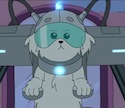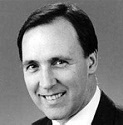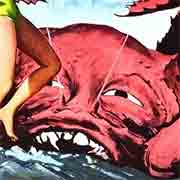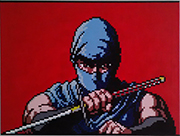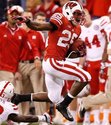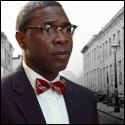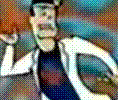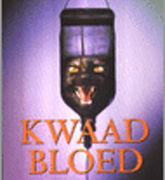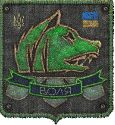|
enuma elish posted:Great book! I definitely liked it, although I felt it suffered a lot from Spinrad's insistence on making the plot mirror every aspect of the Third Reich exactly. I think that its critique of sci-fi would actually have been a lot more powerful if the parallels had been looser, because as it is it seems less like a story and more like Spinrad is checking things off a list. The resemblance on the science-fiction side is not as strong as it could be. Still a great book though. Yeah, the mirroring got old. Thanks, I'll definitely look for that collection. My library doesn't have it, and they aren't doing free ILLs anymore Unfit For Space posted:Another book from a noted SF author along those lines that I really enjoyed is one by Thomas Disch, The Dreams Our Stuff Is Made Of. Library does have this. I put it on my list. Thank you.
|
|
|
|

|
| # ? Jun 5, 2024 10:43 |
|
Recently finished Dune by Frank Herbert. It was the first science fiction book I've read and I really enjoyed it. I think it's difficult to define what the book is about and if someone asked me I wouldn't have a clue what to say. It's a book about religion, politics, emotion, military power and, of course, technology (and a little bit of 'it works because magic!'). About a struggle for power between the 3 (4) major entities of the universe. At times it was a bit err, thick with the philosophy stuff, most of which was lost on me. Some plot points I don't quite 'get', such as why would the Fremen go on a jihad against the rest of the universe? I understand that Paul is basically God to them now and their society is practically built around hardship and fighting but why would they decide to go on a war in honour of their God even against his will? I guess they would fight in order to make him the supreme leader of the universe but he's already managed that so crisis averted? Paul didn't think it was that easy to avoid. I suppose I can give Catch-22 another go but I just can't get into that book, my record is about 120 pages then I just give up.
|
|
|
|
ArcticZombie posted:Recently finished Dune by Frank Herbert. It was the first science fiction book I've read and I really enjoyed it. I think it's difficult to define what the book is about and if someone asked me I wouldn't have a clue what to say. It's a book about religion, politics, emotion, military power and, of course, technology (and a little bit of 'it works because magic!'). About a struggle for power between the 3 (4) major entities of the universe. At times it was a bit err, thick with the philosophy stuff, most of which was lost on me. Some plot points I don't quite 'get', such as why would the Fremen go on a jihad against the rest of the universe? I understand that Paul is basically God to them now and their society is practically built around hardship and fighting but why would they decide to go on a war in honour of their God even against his will? I guess they would fight in order to make him the supreme leader of the universe but he's already managed that so crisis averted? Paul didn't think it was that easy to avoid. I believe the point is Paul tapped into a power, the anger of a people shat on for centuries, that he couldn't control. He is not truly the god he makes himself out to be, just a man thrown into the role of a god (or more accurately, a prophet) due to his powers of foresight. The whole next book, though nowhere near as good as Dune, deals with that failure and how he agonizes over it because he saw it coming and couldn't stop it.
|
|
|
|
The Treasure of the Sierra Madre (1927) Ė B. Traven An enigmatic author, a rambling, dark tale of greed and prospecting, a . . . well, somewhat of a letdown. This book actually suffers by comparison with the excellent film adaptation. This book drags a bit with subplots and historical asides which the film jettisons and the film has a clearer, meaner arc to it. The book is of some interest, but mainly as a companion piece. I wouldn't recommend going out of your way and, if you're going to read it, you're going to have to, as itís not the easiest thing to find. The Sentinel (1983) Ė Arthur C. Clarke Collection of short stories by Clarke. Interesting, mainly because they prefigure some of his greatest works. There's a story here that parallels the first third of Childhood's End, one that's a dry run for the monolith sections of 2001, etc. But I wouldn't go out of your way. Just read the novels. The African Queen (1935) Ė C.S. Forester I feel like Iím about the only person in the whole world who thinks the 1951 film adaptation is overrated. I find both Hepburn and Bogart pretty schticky in the movie and while the film has some funny moments, it also has longeurs and isnít nearly as emotionally resonant as it seems to think it is. I tried reading the novel to see if this would correct a deficit in my understanding of the film. Nope; now I just think the movie and the novel are overrated. Foresterís Hornblower series is good, but, like the film, this novel just takes too long to get to its point and draws its characters in strokes ridiculously broad. The Bridge Over the River Kwai (1954) Ė Pierre Boulle, Xan Fielding Itís rare that one sees this happen, but this novel is so astoundingly inferior to Leanís film adaptation that itís shocking. This novel contains the most basic plot outlines of the film, but, for instance, the William Holden character and the symbolic presence of the American perspective, are not in the novel. Both Saito and Nicholson are more complex characters in the film. And, in a move that is jaw droppingly idiotic, Boulle doesnít even show us the climax in which the bridge is destroyed, but instead simply clinically tells us about it after itís already happened. Itís a rare thing for a film to be simultaneously more visceral and more psychologically and philosophically complex than the book that inspired it. But thatís what happened here. Skip the novel; watch the movie again. The Greatest Gift (1943) Ė Philip Van Doren Stern A short story of barely over 4,000 words, but the story it tells is of a man who gets a glimpse of what life would be without him. It inspired Itís a Wonderful Life, but the film expands the story a tremendous amount. Here, the near suicide on the bridge and its aftermath is almost entirely contextless and the story isnít interested in a lot of the larger points Capra is interested in making. Itís a well written little story without a lot of pretensions. Unlike the film, this one contains a fairly surprising twist at the end which puts the story more in Twilight Zone territory than Capraís film is. A quick read and an interesting comparison to the film.
|
|
|
|
I just finished Ivanhoe. My boss was clearing out his book shelf and gave it to me, a really nice leather-bound with gilded pages. I actually had no idea what the book was about before I cracked it, but turns out it's about knights and Robin Hood and stuff which I really dig.
|
|
|
|
Stuporstar posted:I believe the point is Paul tapped into a power, the anger of a people shat on for centuries, that he couldn't control. He is not truly the god he makes himself out to be, just a man thrown into the role of a god (or more accurately, a prophet) due to his powers of foresight. The whole next book, though nowhere near as good as Dune, deals with that failure and how he agonizes over it because he saw it coming and couldn't stop it. Exactly. Paul and Jessica were able to briefly exploit the Fremen's preexisting beliefs and superstitions to survive and avenge Duke Leto, but they couldn't control the Fremen forever. Paul used the Fremen to avenge his father, and they used him as a figure-head for their jihad.
|
|
|
|
The Ultimate Cyberpunk curated by Pat Cadigan. A collection of short stories from the most well-known cyberpunk writers (Bruce Sterling, William Gibson, Rudy Rucker, etc) including the never-before-published part 2 of William Gibson's illustrated Neuromancer. This collection was really enjoyable and there weren't really any bad stories in it. It's a good place to start if you haven't read a lot of cyberpunk stuff before but it's equally good as a book to round out your collection if you've already read a lot of these authors before. As with most cyberpunk novels, I found the most interesting aspect of the stories to be the way people envisioned the future 20-30 years ago and how right or wrong these predictions can be. I particularly enjoyed Green Days in Brunei by Bruce Sterling Fondly Farenheit by Alfred Bester.
|
|
|
|
cyberia posted:Fondly Farenheit by Alfred Bester. loving thank you! I was trying to remember the name of that short story earlier today. It was burning a hole in the back of my brain. Now, if I can't find that Bester short story collection I read years ago, I know where else to find it. Been meaning to reread it. Edit: Found it. Goddamn. I want to make love to Bester's stories, recombo their DNA, and have his mind babies. Stuporstar fucked around with this message at 06:59 on Aug 30, 2012 |
|
|
|
I just finished reading Snow Crash by Neal Stephenson. Honestly, I wasn't a huge fan. The world was interesting enough, but there was way too much exposition dragging down the middle third. The ending was short and anti-climatic, and it felt like every action sequence relied on deus ex machina. Oh hey, this person happens to have the perfect tool to solve this situation, but it hasn't been mentioned until now! And the sex scene was a bit of an eye-roll moment. Not really the fault of the book, but I found the protagonist really hard to take seriously, simply because he's obviously the inspiration for so many internet stereotypes. I couldn't picture him as anything other than someone like this.
|
|
|
|
I just finished Jules Verne's Around the Moon. I have not read From Earth to the Moon, I just opened a random unlabelled e-book. This loving book. Much of it is made up florid but vague descriptions of place after place, geological feature after geological feature, obviously written by looking at a map and just going to town. This becomes pretty clear while he's writing about the moon, but the trip across the desert southwest makes it pretty much indisputable. Verne writes about some idealized American desert, the desert of westerns and Road Runner cartoons (which shows how far back this imagery goes); bearing only passing similarity to reality, and far more uniform than the real thing. I made it through these passages, however, by anticipating the OMG crazy bullshit about the moon and space. There's so much in here that is wrong, and most of it could have been confirmed at the time the book was written. Some things, in fact, are directly contradicted in the story. For instance, when the dead dog is put out of the projectile and floats weightlessly around it, all the while everything inside the projectile fell toward the floor. Only when they reach the "neutral point" will things inside the projectile become weightless. The rationalizations as they see more and more evidence that the moon is dead finally giving way to acceptance of it (even despite what they think they see for a moment at the edge of the dark) is kind of interesting. The dialogue between the three (loving insane) astronauts seems like a good representation of the emergence of consensus. I presume most of what is said of the moon, both what is presented as fact and what is presented as speculation is what was believed at the time by astronomers. I find it remarkable the lengths the characters go to do dismiss the possibility of impact craters despite having one near miss and actually being hit once themselves by objects in space, and the absolute presumption that the moon is volcanic and that all the craters must be volcanic. I'd known about the belief that the sun was powered by combustion, and that does appear, but what I didn't know was that either scientists believed or Jules Verne had his own crazy idea that volcanism was as well, because there is mention of it requiring oxygen. That was one of the bigger WTF moments I think. The amount of That said, there is one passage, clearly the author venting at the reader, which is worth remembering and not just for its comedy value: quote:Science, or rather pseudo-science, always exerts a mysterious attraction of an exceedingly powerful nature over the generality--that is, the more ignorant portion of the human race. Assert the most absurd nonsense, call it a scientific truth, and back it up with strange words which, like potentiality, etc., sound as if they had a meaning but in reality have none, and nine out of every ten men who read your book will believe you. Acquire a remarkable name in one branch of human knowledge, and presto! you are infallible in all. Who can contradict you, if you only wrap up your assertions in specious phrases that not one man in a million attempts to ascertain the real meaning of? We like so much to be saved the trouble of thinking, that it is far easier and more comfortable to be led than to contradict, to fall in quietly with the great flock of sheep that jump blindly after their leader than to remain apart, making one's self ridiculous by foolishly attempting to argue. Real argument, in fact, is very difficult, for several reasons: first, you must understand your subject well, which is hardly likely; secondly, your opponent must also understand it well, which is even less likely; thirdly, you must listen patiently to his arguments, which is still less likely; and fouthly, he must listen to yours, the least likely of all. If a quack advertises a panacea for all human ills at a dollar a bottle, a hundred will buy the bottle, for one that will try how many are killed by it. What would the investigator gain by charging the quack with murder? Nobody would believe him, because nobody would take the trouble to follow his arguments. His adversary, first in the field, had gained the popular ear, and remained the unassailable master of the situation. Our love of "Science" rests upon our admiration of intellect, only unfortunately the intellect is too often that of other people, not our own. How many times has the scenario he lays out there played out in the last 140 years? webmeister posted:I just finished reading Snow Crash by Neal Stephenson. If you read Snow Crash and any expectations for it to be serious lasted past the first page, I dunno what to say. The exposition in the middle was kind of dead weight, as honestly it could have been replaced with any bullshit of any kind, and it did have some pacing problems. On a related note, has Neal Stephenson ever written a book with a satisfying ending? And Hiro Protagonist (you'll never forget it) is what those people imagine themselves to be.
|
|
|
|
Just finished "The Apocalypse Codex" by Charles Stross, great addition to his "Laundry Files" series. Fun read if you like sci-fi, James Bond, and Lovecraftian monsters.
|
|
|
|
VideoTapir posted:The exposition in the middle was kind of dead weight, as honestly it could have been replaced with any bullshit of any kind, and it did have some pacing problems. On a related note, has Neal Stephenson ever written a book with a satisfying ending? Cryptonomicon has a very satisfying ending and Hiro is kind of a joke - all the master samurai hacker ninja stuff is clearly hard to take seriously - but he's also kind of a serious character and the process of his coming to maturity over the book is, I think, one that's at least partly serious. It's a weird balancing act, not one that I think is entirely successful. Bob Ojeda fucked around with this message at 22:59 on Aug 30, 2012 |
|
|
|
Galapagos by Kurt Vonnegut. An odd set of circumstances causes a small group of people to become stranded on the Galapagos Islands, which turns out to be quite the lucky occurrence since a global catastrophe wipes out the rest of humanity. A million years later, this small ancestral population has evolved into small-brained seal-like beings to the benefit of everyone involved. The narrator is a ghost. Not quite up there with Vonnegut's strongest novels, his attempts at poignancy fall mostly flat while the humour is very subdued. However, suprisingly correct on the science for a book that's clearly not meant to be a serious attempt to accurately represent evolution. Genetic bottlenecks, contingency and convergence are described in a whimsical yet largely correct way. Overall I'd recommend it to fans of Vonnegut and Darwin but it's probably not a good first exposure to either.
|
|
|
|
The Story of Astronomy by Heather Couper and Nigel Henbest. 3.5 stars.my goodreads review posted:Kind of like the "Short History of Nearly Everything" of astronomy. The balance of science to biography/history is something like 30% to 70%. I was hoping for a bit more of the hard science, but I guess this book is chasing more of a general audience. The fact that this book is 240 pages and has no diagrams, footnotes/endnotes, or bibliography, should tell you what kind of book this is. I'm now going to find some other astronomy/astrophysics books that have a bit more about the science.
|
|
|
|
Just finished Game Of Thrones, had bought it prior to the show starting but lost motivation to read it after watching it. So a while back I went back to it, mostly because it had been a year since the first season so it wasn't so fresh in my memory. Also heard the battles were more detailed, which there is only one of. Was fun to read despite being a slog, knowing all the twists certainly didn't help. The POV chapters help understand the characters a lot more than the show. Like why Jon is always confused, in the show he just stays silent with his mouth open. Not going to compare the show and the book but one last thing, that scene with Lord Frey in the book was hilarious. I'd say reading the book then watching the show would be more enjoyable than watching the show then reading the book, I did the latter and like I said at times it was a slog. Going to read something else before jumping to Clash Of Kings.
|
|
|
|
I haven't finished a book in 5 months and am embarrassed.
|
|
|
|
I'm sad that the Faulkner thread has gone away, but anyway I just finished the Snopes Trilogy. It's either a major indictment of our era or of me personally, but I actually don't think Flem is a bad guy. To me it seems like most of his worst qualities are merely assumed by the entrenched elite who stand to lose ground when Flem moves up the social ladder. There are only a few instances of amoral actions in the entire trilogy by Flem, and I find moral failings much easier in Will Varner, Gavin Stevens (who I think is absolutely insufferable), and (obviously) Manfred De Spain. All Flem seems to want is to become a respected pillar of his community, and he even explicitly rejects a "mobility at all costs" mentality when he allows Linda to go to Ole Miss and dismisses the idea outright when quoted a price to put a hit on someone.
Nimmy fucked around with this message at 10:08 on Sep 2, 2012 |
|
|
|
Finally got around to reading "I Am Legend" (Richard Matheson) A funny thing reminded me that I wanted to check it out, I had found one of those sites that does funny/interesting lists, and I found a great quote from Matheson regarding his books and Hollywood quote:I don't know why Hollywood is fascinated by my book when they never care to film it as I wrote it I definitely preferred the book.
|
|
|
|
Finished The Fountains of Paradise. (USER WAS PUT ON PROBATION FOR THIS POST)
|
|
|
|
Just finished reading Somerset Maugham's Of Human Bondage. I thought it was absolutely superb, particularly Philip's development over the course of his life. Perhaps because I can identify with Philip in many ways it felt as though I had grown with him, but it never felt rushed. There were times during my reading of it that it seemed to drag on a bit, but to look it as a whole I can't think of much that was unnecessary.
|
|
|
|
I just finished Mockingjay by Suzanne Collins. Holy poo poo was this series crazy. I found this book hard to get through, especially the last half, because I had it spoiled that Primrose dies. Oh well, I was rooting for Katniss and Peeta from the beginning so I was satisfied with the ending. That makes 15 books read this year, out of my goal of 40. According to goodreads, I'm 10 books off pace. 
|
|
|
|
Socialized posted:
Even without that being spoiled I found it pretty hard to get through, honestly I wish I'd just quit after the first book.
|
|
|
|
Just finished Junky and then Naked Lunch by William S. Burroughs. Going to be making a thread for him in a few days. This was my second reading of Naked Lunch, and it was a lot more enjoyable than the first one. Junky acts as a prequel to it, and since the first read, I saw a documentary about him. Not to mention, knowing what to expect (as well as knowing some of the slang in the book) made it much less confusing the second time.
|
|
|
|
Kekekela posted:Even without that being spoiled I found it pretty hard to get through, honestly I wish I'd just quit after the first book. Augh, this is why I've only read the first book. I want to read the second and third ones, but I keep hearing people say they found it to be a downer or they didn't like the ending. escape artist posted:Just finished Junky and then Naked Lunch by William S. Burroughs. Going to be making a thread for him in a few days. This was my second reading of Naked Lunch, and it was a lot more enjoyable than the first one. Junky acts as a prequel to it, and since the first read, I saw a documentary about him. Not to mention, knowing what to expect (as well as knowing some of the slang in the book) made it much less confusing the second time. When I read Naked Lunch, I thought: If I hadn't seen the movie already, I'd have no drat clue what was going on. I appreciate the experimental technique (cut up or whatever it is?) but it certainly didn't make the book more readable. The best thing I can say about it is it seemed to me the format and style conveyed the discombobulated feeling of being out of your mind on drugs. I can only assume though, not having tried heroin. 
|
|
|
|
Theomanic posted:When I read Naked Lunch, I thought: If I hadn't seen the movie already, I'd have no drat clue what was going on. I appreciate the experimental technique (cut up or whatever it is?) but it certainly didn't make the book more readable. The best thing I can say about it is it seemed to me the format and style conveyed the discombobulated feeling of being out of your mind on drugs. I can only assume though, not having tried heroin. He hadn't discovered (if that's the word) cut-up by Naked Lunch. Check the Ticket That Exploded, Nova Express and Soft Machine for that. It's where he writes something, then cuts the paper down the middle and re-arranges this. What's going on in N.L. is a man being so high on weed that he can't write more than a chapter at a time, then some friends descending and lashing those chapters into shape.
|
|
|
|
Mr. Squishy posted:He hadn't discovered (if that's the word) cut-up by Naked Lunch. Check the Ticket That Exploded, Nova Express and Soft Machine for that. It's where he writes something, then cuts the paper down the middle and re-arranges this. What's going on in N.L. is a man being so high on weed that he can't write more than a chapter at a time, then some friends descending and lashing those chapters into shape. He at least wrote some of N.L. in heroin detox. There's an extra hundred pages or more in the Restored Text that talks some about how he came to write it. And yeah, Kerouac and Ginsberg helped in the editing process. But it wasn't arranged exactly how he intended, the publisher called him and was like "we need this in two weeks", so it was rushed. Speaking of the movie, I'm going to check it out soon. I decided to read the book before watching the movie. Also, am I to infer that his later post-N.L. novels are even more discombobulated than N.L. itself? Ugh, don't know if I can handle that. I'm reading Queer next, so I know it won't be a problem there.
|
|
|
escape artist posted:Just finished Junky and then Naked Lunch by William S. Burroughs. Going to be making a thread for him in a few days. This was my second reading of Naked Lunch, and it was a lot more enjoyable than the first one. Junky acts as a prequel to it, and since the first read, I saw a documentary about him. Not to mention, knowing what to expect (as well as knowing some of the slang in the book) made it much less confusing the second time. Whoa, we're on the same page. I just read "You Can't Win" by Jack Black, which inspired Junky, then read Junky, now I'm reading Naked Lunch. Honestly I liked Junky more; the trippiness of Naked Lunch is over the top and a lot of the profanity just seems dated ("Ok, you're talking about skullfucking. I've seen The Aristocrats and read Somethingawful for years; this isn't shocking me")
|
|
|
|
|
Hieronymous Alloy posted:Whoa, we're on the same page. I just read "You Can't Win" by Jack Black, which inspired Junky, then read Junky, now I'm reading Naked Lunch. Honestly I liked Junky more; the trippiness of Naked Lunch is over the top and a lot of the profanity just seems dated ("Ok, you're talking about skullfucking. I've seen The Aristocrats and read Somethingawful for years; this isn't shocking me") I couldn't finish Naked Lunch when we had it for book of the month, despite being the one who nominated it. But once I read Junky, and saw the documentary W.S. Burroughs: The Man Within, I gave it another shot. It's good, I'm glad I read it, but I prefer the style of Junky more, too. I expect Queer will be good. Also, Naked Lunch (the Cronenberg film) is not an adaptation of the book. It is a mix of biography and some elements of the book. For example, Lee is addicted to heroin, not bug juice, in the book, and Burroughs really did kill his wife while playing an intoxicated game of William Tell. Him accidentally killing his wife is what apparently inspired him to become a writer, or something... I didn't quite get the connection when watching the documentary. But anyway, we'll have a whole thread dedicated to him soon, once I stop being lazy. I promise by the end of the week. I have a few other things I want to watch to incorporate them into the OP (A Junky's Christmas, Destroy All Rational Thought, Commissioner of Sewers) edit: Oh poo poo, I just realized Peter Weller plays Burroughs/Lee in the film 
escape artist fucked around with this message at 20:57 on Sep 4, 2012 |
|
|
|
escape artist post the thread, I had like 2 paragraphs here about Burroughs that I deleted for being off-topic. I finished a selection of Nabokov's letters. Selected by his son and somebody else, which, when taken with an early letter where N. himself edits out an affectionate address to his own mother (for propriety's sake?), makes you wonder what bodies they've left undisturbed. At least they didn't retain intact the endless haggling with agents which most writer's letters seem to be about. Just enough that you get a sense of what a nightmare N. must have been to work with. As he grows older, you can witness an explosion of pedantry. He rejects totally the idea of an external editor as it creates a bastard of one man's thoughts over another's, he insists journalists don't report anything he says except pre-written statements, and develops a theory of translation where any paraphrase is death. There aren't many letters on what I like in his books (there's one letter where he describes his fiction as a net within which you can detect the flutters of the story), but when he offers to produce a list of where exactly Pnin has lived, I guess I'm just glossing over the gloriously exact detail. Also, you would not believe how many ways there are to be wrong about butterflies. Then was Dostoyevsky's The Gambler, a novella which my copy beefed up with Bobok and A Nasty Story, all translated by Jesse Coulson. The Gambler, written under the lash to escape financial ruin, and drawing heavily upon his own gambling experiences is very, very good when describing the rush, exhilaration and confusion of great excitement. It also satirizes Russian aristocracy who are a little less good and a lot less rich than they ought to be, a concern shared with the short stories. A Nasty Story was for me, excruciating to read, so masterfully did he construct a journey into the hells of embarrassment. I finally (finally!) finished off Roderick Hudson after carting it about for more than a year... and all said, I didn't like it. The static love-triangles which make up the bulk of the novel just aren't interesting to me. There is one killer speech in it, given by Christina Light's mother, and of course the sentences throughout are beautiful, but I'll probably stick to his shorter works. I don't share James' love of soap-opera Finally I've been reading what I've been chastised for calling airport fiction; a collection of Chandler's stories called Trouble is My Business, Graham Greene's A Quiet American, and le Carres' The Spy Who Came in From the Cold. The Chandler is of course great fun, though even reading four together is enough for the seams to start showing (especially Goldfish which is one twist too long, feeling rushed and silly). My favourite of the bunch is Red Wind, where all the funny coincidences that would normally turn out to be conspiracies remain random. While that sounds like it could just be lazy writing, when it's all written against the oppression of an el Nino, it feels quite profound. The Greene is a fun-enough look at America's rise as a no-colonialist power set against the hand-over of the Vietnam War. The titular American is just a bit too perfect a metaphor for American foreign policy to be believable as a character, but just a bit. A worse problem is Greene's occasionally over-cooked similes; I can take a westerner looking "like a man who owes his friends to using the right kind of deodorant", but when a car's open bonnet looks like "the gaping maw of a pre-historic animal in a little-visited county museum", you can gently caress off. As for the le Carre, all that needs to be said is that the book made me forgive the inclusion of a young woman falling in love with a grumpy old man (the most god-awful wish-fulfilling plot point to ever infect almost all books). The way it plays with perceptions, nudging you into accepting the lesser of two evils before throwing you into the depths of a third is masterful, and the economy of words. I was dreading the final chapter where everyone's back home and rehashing what happened for the slow kids to catch up, and it didn't ever come, just straight action till it ends.
|
|
|
|
Theomanic posted:Augh, this is why I've only read the first book. I want to read the second and third ones, but I keep hearing people say they found it to be a downer or they didn't like the ending. I just thought they flat out sucked. I found the first one interesting because of the whole dynamic of the games, the last two were basically like a really bad Lifetime movie.
|
|
|
|
Mr. Squishy posted:escape artist post the thread, I had like 2 paragraphs here about Burroughs that I deleted for being off-topic. well, un-delete them and post them here: http://forums.somethingawful.com/showthread.php?threadid=3505231
|
|
|
|
Mr. Squishy posted:He hadn't discovered (if that's the word) cut-up by Naked Lunch. Check the Ticket That Exploded, Nova Express and Soft Machine for that. It's where he writes something, then cuts the paper down the middle and re-arranges this. What's going on in N.L. is a man being so high on weed that he can't write more than a chapter at a time, then some friends descending and lashing those chapters into shape. I didn't say he discovered it, just that it's an experimental technique that he used, but thanks for the clarification. I believe his exact method was akin to throwing papers around and mixing up the order. escape artist posted:Also, Naked Lunch (the Cronenberg film) is not an adaptation of the book. It is a mix of biography and some elements of the book. For example, Lee is addicted to heroin, not bug juice, in the book, and Burroughs really did kill his wife while playing an intoxicated game of William Tell. Him accidentally killing his wife is what apparently inspired him to become a writer, or something... I didn't quite get the connection when watching the documentary. Not an adaptation, for sure, but extremely helpful in contextualizing the events of the book as they're so disjointed. I read this book along with some friends and the ones who had not seen the movie were way more confused about what was going on.
|
|
|
|
Just finished Solaris by Stanislaw Lem. It went by pretty fast (the modest page count helps) and I certainly enjoyed it. My main complaint is that parts of the book are written really simply, almost dumbed down, while others read very technical and dry like a science textbook. I suspect this is due to the Polish-to-English translation though. Also finished Consider Phlebas by Iain M Banks. I enjoyed it, though it read a bit slower and choppier than Solaris. stimulated emission fucked around with this message at 23:57 on Sep 6, 2012 |
|
|
|
Disappointing book month. I read The Jaguar by T. Jefferson Parker, an author I usually love, and didn't like it. Too woo, or something, along with predictable and not tied to reality in any way. Then I read Nick Hornby's A Long Way Down and...okay, it was not awful, but it was kind of disappointing, felt too long, had some interesting elements but left a lot to be desired WRT character development/arc. I'm not sure all characters need them anyway but if you're going to do one, make it believable. Finally, after really loving Gone Girl, I read an earlier Gillian Flynn, Dark Places, and this one did not disappoint. I love the language. I love the character of Libby, just the way she's presented, the way she thinks of herself, what other people see. I liked this one even better than Gone Girl but yes, it's dark.
|
|
|
|
Anarchy In Action by Colin Ward. Fantastic depiction of an ideal anarchy society while attempting to show people that it has actually been successful in some small happenings in the world.
|
|
|
|
|
Two bricks. The Reformation: A History Diarmaid MacCulloch. Covers the three hundred years of (mostly) European history where the Latin church fractured under the strain of its own theological faults and fissures. I was raised a catholic, which of course means I know almost nothing about the church and its history. I can see why they don't stress that history: it's not inherently exciting, except for the parts that are morally dubious. But the author's writing is great, and made the abstract theological issues come to life for me: now I know what a Protestant is and why they are Protestants. One of the backdrops to this story that I never really knew was the millennial fever that consumed Europe between 1500-1600: since people assumed they were living in the last days, this gave theological issues much more urgency, and really amped up the differences between people on what seem to me to be incredibly minor theological points (one result is the re-admittance of Jews into England, since the Protestants there believed in the prophesy that the second coming was preceded by the conversion of the Jewsóthis makes Pat Robertson slightly more intelligible to me). The differences between Rome and the Protestants came down to the question of ultimate authority: church or bible. But the manifestations of this difference were strange, particularly to a modern areligious reader: quote:Few people in modern Europe now understand how urgent these arguments were in the sixteenth century. That urgency gave rise to what has been called 'theological road rage,' and we have viewed many of the dire consequences. Europeans were prepared to burn and torture each other because they disagreed on whether, or how, bread and wine were transformed into God, or about the sense in which Jesus Christ could be both divine and human. We have no right to adopt an attitude of intellectual or emotional superiority, especially in the light of the atrocities that twentieth-century Europe produced because of its faith in newer, secular ideologies. Anxiety and a sense of imperfection seem to be basic components of being human, for those of no religion as well as the religious. Some continue to call the answer to these miseries by the name of God. God's War: A New History of the Crusades by Christopher Tyerman Something like a thousand pages covering the 500 years when some Europeans felt the need to go and fight heretics, not just in the Levant, but also Spain, the Balkans, Poland, Scandinavia, and wherever these heathens threatened the Latin church by their very existence. The author stresses that these Catholics were probably driven mostly by sincere religious piety (not just avarice and the desire for excitement), contradicting some historians who claim that crusades were driven by laterborn sons in search of land and treasure and bloodthirst. What a difference the author's writing style makes. The canvas of both of these books span centuries and continents and generations of people, but if you had to choose one whose subject alone was more likely to produce the more exciting narrative, you'd have to go with the book about the crusades, right? Knights, pilgrimages, sieges, huge battles, what could be better? Unfortunately, the author just cannot commit to a good narrative style: he insists on shooting himself in the foot by giving a summary of the upcoming action before going into the description, thereby robbing it of any suspense as to the outcome. I have no idea why he does this, but it drove me insane. Contrast that to The Reformation, a book about potentially boring poo poo that was made into a great read through the author's use of dry humor and irony and commitment to a clear narrative, even though the story itself is not based on people but ideas. This was 800 pages of people discussing antinomianism and transubstantiation and it just flew by.
|
|
|
|
Iron Gray Sea by Taylor Anderson The seventh in the Destroyermen series and not even close to the last one. I'm kind of hoping he resolves the plot in at least the next couple books but with what he put in this one he could easily go on for another three or so. The book itself was pretty good but I have a feeling he's going to pull a Brandon Sanderson and make it a ten or twelve book series.
|
|
|
|
Mr. Squishy posted:Finally I've been reading what I've been chastised for calling airport fiction; a collection of Chandler's stories called Trouble is My Business, ... The Chandler is of course great fun, though even reading four together is enough for the seams to start showing (especially Goldfish which is one twist too long, feeling rushed and silly). My favourite of the bunch is Red Wind, where all the funny coincidences that would normally turn out to be conspiracies remain random. While that sounds like it could just be lazy writing, when it's all written against the oppression of an el Nino, it feels quite profound. Trouble is My Business is not a great collection. I seem to remember that it was basically all the sort stories that hadn't already been collected elsewhere. Although it does contain the story that was later rewritten as "The Long Goodbye", and actually explains a lot of plot holes from excised plot elements. Now, content: Night Watch - Sergei Lukyanenko Angels of the Universe - Einar MŠr Guūmundsson The first - or part of the first - was turned into the movie of the same name. And tragically, the movie is much better and in fact a different sort of thing. For those who don't know, Night Watch is about Light and Dark magicians (not exactly good and evil but more idealists and cynics) bound by a treaty but locked in a cold war in which they maneuver for an advantage over each other. It reads a bit lumpishly, the narrator is going on all the time about the tunes he's listening on his walkman, the magical "laws" are at times opaque ... by the end I guess I was reading just because of my good memory of the movie. Skippable. It seems that everyone in Iceland is an artists of some sort and prizes for novels grow on trees. Angels of the Universe won some sort of prize, so I threw it in my pile of "Icelandic literature to be read". It's a slip of a novel, with the now-dead narrator looking back on his life and descent into madness. It's a touch ephemeral, but the scenes of insanity are well written, with the narration slowly becoming strange and manic. Not quite as hilarious as the back cover promises (maybe it's Icelandic humor) but well written. Worth a look.
|
|
|
|
Just finished reading The One Tree by Stephen Donaldson. Ended on a slightly sad note, as the quest had to leave the Isle without creating a new Staff of Law, as well as the fact that Seadreamer had been killed.  Still, looking forward to reading the next book in the trilogy/Chronicles - and hopefully they'll be able to scrape through; both in the 'real world' and the Land! Still, looking forward to reading the next book in the trilogy/Chronicles - and hopefully they'll be able to scrape through; both in the 'real world' and the Land!
|
|
|
|

|
| # ? Jun 5, 2024 10:43 |
|
Finished The Hour Between Dog and Wolf http://www.powells.com/biblio/1-9781594203381-1 Was good, a lot of info I knew. Some new stuff was learned, like how to get tougher so you can control your brain. Recommended for anyone interested in human psychology and the markets. Preferably both.
|
|
|









